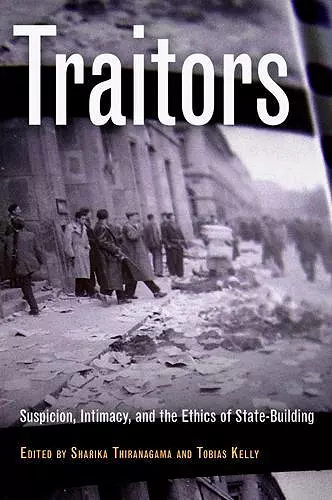Traitors
Suspicion, Intimacy, and the Ethics of State-Building
Tobias Kelly editor Sharika Thiranagama editor
Format:Paperback
Publisher:University of Pennsylvania Press
Published:29th Nov '12
Should be back in stock very soon

The figure of the traitor plays an intriguing role in modern politics. Traitors are a source of transgression from within, creating their own kinds of aversion and suspicion. They destabilize the rigid moral binaries of victim and persecutor, friend and enemy. Recent history is stained by collaborators, informers, traitors, and the bloody purges and other acts of retribution against them. In the emergent nation-state of Bhutan, the specter of the "antinational" traitor helped to transform the traditional view of loyalty based on social relations. In Sri Lanka, the Tamil Tigers' fear of traitors is tangled with the Tamil civilians' fear of being betrayed to the Tigers as traitors. For Palestinians in the West Bank, simply earning a living can mean complicity with people acting in the name of the Israeli state.
While most contemporary studies of violence and citizenship focus on the creation of the "other," the cases in Traitors: Suspicion, Intimacy, and the Ethics of State-Building illustrate the equally strong political and social anxieties among those who seem to be most alike. Treason is often treated as a pathological distortion of political life. However, the essays in Traitors propose that treachery is a constant, essential, and normal part of the processes through which social and political order is produced. In the political gray zones between personal and state loyalties, traitors and their prosecutors play roles that make and unmake regimes. In this volume, ten scholars examine political, ethnic, and personal trust and betrayals in modern times from Mozambique to the Taiwan Straits, from the former Eastern Bloc to the West Bank.
This fascinating collection studies the tension between close personal relationships, the demands of nation-states, and the moral choices that result when these interests collide. In asking how traitors are defined in the context of local histories, contributors address larger comparative questions about the nature of postcolonial citizenship.
"Traitors offers an unusually creative angle on some classic ethnographic problems related to states, citizenship, identity, and political opposition. The authors look to treason as a domain where the intricate entanglements of state practice and social life (even intimately private life) become concretely visible. In the process, the book yields something highly original—ethnographies of state power from the standpoint of its improvised reversals."—Carol J. Greenhouse, Princeton University
ISBN: 9780812222371
Dimensions: unknown
Weight: unknown
312 pages